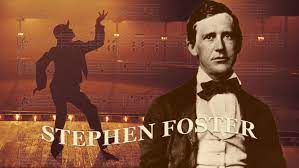| Before radio and television, movies and recordings, entertainment was often a family or community matter. |
| Someone in the family could play a musical instrument, or a neighborhood musician would play for small gatherings. |
| In addition, there would be travelling groups of musicians, actors and clowns who would go from town to town. |
| In nineteenth century United States, one of the most popular forms of entertainment was the minstrel show. |
| Black slavery was still permitted in the southern states until 1865. |
| Even after that date, the lives of many blacks working on large farms or plantations did not change much. |
| They did hard physical labor in the fields, had little control over their lives, and very little time to relax with their friends. |
| Foster, who was born in 1826, made this situation the background for many of his songs. |
| White musicians would try to imagine the feelings of black men and women working on the plantations. |
| They would write songs in the dialect or speech patterns that they thought black slaves used. |
| In these songs, the black people would be talking about their hardships, falling in love, playing music and dancing, |
| and finally growing old and dying. |
| White performers would blacken their faces and sing these songs to white audiences. |
| They would play musical instruments, like the banjo – a small four-stringed guitar, which black people played often. |
| As a small boy, Stephen Foster had sometimes been taken to a black church by his family’s black servant, Olivia Pise. |
| Here he first heard the melodies that inspired his own songs. |
| Only a couple of Foster’s songs are based directly on “Negro spirituals”, |
| but many of his songs have the natural simplicity and emotional power of folk songs. |
| The youngest member of a large family, Foster showed his musical talent at an early age. |
| He played the flute, violin, and piano. |
| Growing up in an energetic business family, Stephen was expected to become a businessman. |
| And, for a while, he worked as a bookkeeper. |
| All his spare time, however, was spent writing songs. |
| Foster attended minstrel shows and tried to get the performers to sing his songs. |
| Sometimes the performers would steal his songs and publish them under their own names. |
| Copyright laws were weak and rarely enforced, |
| so some music publishers would just go ahead and publish a song without paying the songwriter. |
| Since Foster hoped to make a living as a songwriter, this was a problem. |
| Foster’s first hit song was “Oh! Susanna” published in 1848. |
| It became popular with the thousands of men from all over the United States |
| who were heading west to the Californian gold-rush of 1849. |
| Unfortunately, as an unknown songwriter, Foster received no money from his early songs. |
| He seemed to have given them outright to the music publishers, just to establish his reputation. |
| Foster’s name, however, was soon widely known, |
| and in 1849 he was able to afford to give up bookkeeping, |
| and marry the daughter of a Pittsburgh physician. |
| During the next five years, he earned a moderately good income from songwriting. |
| In 1851, a daughter Marion was born. |
| Foster wrote many of his best-known songs at this time: “Old Folks at Home” in 1851; |
| “My Old Kentucky Home” in 1853, |
| and “Jeanie With the Light Brown Hair” in 1854. |
| Difficulties in Foster’s marriage began fairly soon. |
| These may have been partly due to his strange work habits. |
| He spent days locked in his room working on his songs. |
| Then he would rush out with his materials to the local music store, |
| presumably to test out the songs on his friends. |
| He also became more and more addicted to alcohol. |
| Eventually, his wife and daughter left him. |
| Foster died alone in a rooming house in 1864. |
| Immigrants to the United States brought their traditional folk songs with them. |
| However, there were very few typically American songs. |
| Foster provided many songs that expressed the life of nineteenth century U.S.A. |
| His songs were easy to sing, and were popular with nearly everyone. |
| In a sense, Foster helped to create roots for American popular music. |
More English listening lessons for intermediate level:
Lesson 76: The story of Anne Frank





